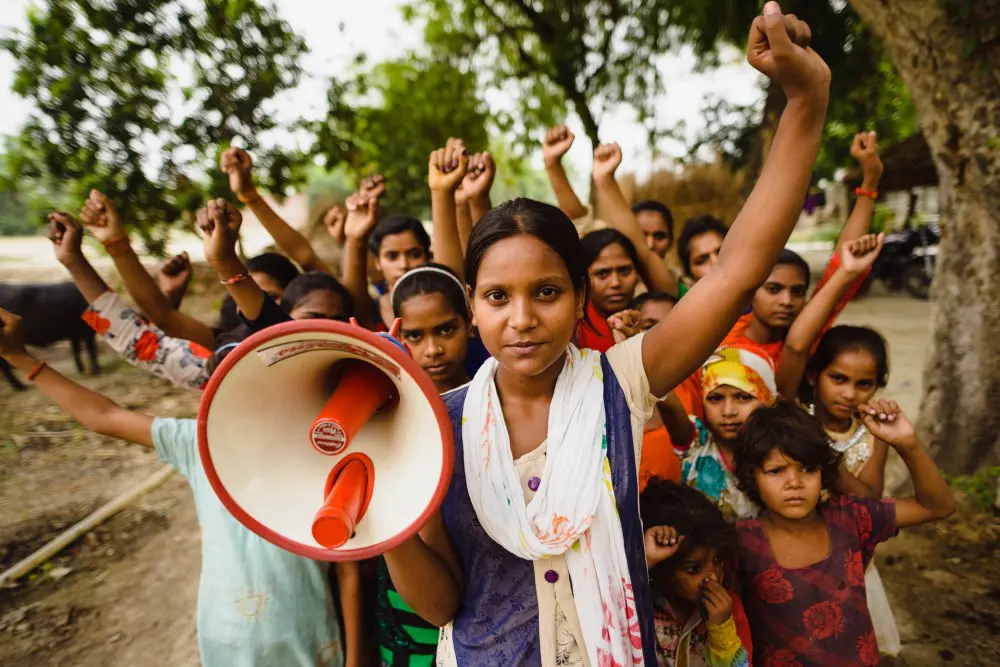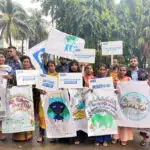Media Centre - Media release - 18 November 2022
As COP27 draws to a close, girls across Asia Pacific are the most affected by climate change and are also the best placed to help fix it, says new report

Australia has also made almost no progress of girls’ leadership goals since the last report and has ceded its previous number one ranking on the Girls Leadership Index to New Zealand.
The Asia-Pacific region has been experiencing extreme environmental shocks of late. It is the region in the world that has experienced the most natural disasters in the past 30 years, from Australian bushfires and floods to Typhoons in the Philippines and Pacific tsunamis. The region now faces mass flooding, land loss and water stress as the climate continues to change dramatically.
And it is girls – especially adolescent girls – that are at the forefront on the impacts of climate change, according to a new report on Australia and the Asia Pacific by girls’ equality charity Plan International.
These disasters and subsequent damage impact the rights and development of girls, young women and gender-diverse people due to the combined effects of age and gender discrimination. Climate change magnifies the existing inequalities girls and young women face, including their unequal access to health, sexual reproductive health and rights, education, participation and protection.
Plan International’s 2022 Girls Report: Their Fight for the Future presents the region’s state of girls’ and young women’s leadership and the impacts they are having on climate change movements.
In partnership with the Stockholm Environment Institute (SEI), surveys, interviews and detailed research reveals how girls and young women change makers are successfully demanding climate justice in the Asia-Pacific region. In both online and offline spaces, girls and young women are collaborating to change the conversation and influence policy at national and international levels – 93% of girls surveyed identified as engaging in policy-making processes, ranging from agenda setting and policy formulation to implementation and monitoring.
“Plan’s report found that a majority of girls, young women and gender-diverse people are fighting for a better future,” says Susanne Legena, CEO of Plan International Australia. “In the report, 85% of survey respondents indicate that being a girl or a woman motivates them to advocate for climate change and justice. But that does not mean it is easy with young female climate advocates saying that they often feel rejected and isolated – some even report physical, mental and other forms of abuse due to their involvement.”
Many governments have low policy priority on climate change, especially when acknowledging girls and young women as agents of change. Coupled with unequal gender norms, it can be hard for some girls to feel comfortable in their climate influencing: one in three young girls and young women said they lack confidence participating.
“We have to help girls and young women speak out and we must take them seriously, listening to those that are affected most by the changes wrought by our changing climate,” Ms Legena says.
“Through this persistence, girl-led climate action and influencing can become a catalyst for change across the region potentially preventing the worst aspects of the climate crisis.”
The report also identifies other enabling and constraining factors facing young women when trying to develop leadership capabilities in the region – through the Asia and Pacific Girls Leadership Indexes (GLIs).
“When girls and young women are given the support and opportunity to take leadership and stand up for the future of the planet, marginalised voices can be heard and everyone benefits,” said Bhagyashri Dengle, Regional Director, Plan International Asia-Pacific Hub. “Girls and young women continue to face multiple challenges and barriers in their lives, and they are disproportionately affected by climate change. This report demonstrates a girl’s ability to break through barriers.”
Australia needs to do more
As a leader in the region, the report has shown that Australia needs to do more to help the girls, young women and gender-diverse people in the Asia-Pacific region.
In the same week that Australia’s half-time assessment for its performance at COP27 in Egypt received just a 50% pass mark from The Climate Council, the country has also shown very little improvement in Plan International’s Their Fight for the Future report.
Not only did Australia lose its position as number one on the Girls Leadership Indexes (GLI) to New Zealand but of the three highest-ranking countries in the 2022 Pacific GLI – New Zealand, Australia and Kiribati – the positive increases were greater for New Zealand (0.065) and Kiribati (0.019), with Australia barely improving at all (0.001) in the past 12 months.
The Girls’ Leadership Indexes, launched in 2019, is uniquely focused on adolescent girls and young women, measuring environmental conditions that allow girls to exercise agency, voice and participation in their own lives.
The indexes analyse 33 countries across Asia-Pacific, measuring seven key areas in society: education, health, economic opportunities, protection, political voice and representation, laws and policies and climate action.
Split into two different indexes for 19 countries in Asia and 14 in the Pacific, this year’s indexes offer cause for optimism: Over 70% of countries have shown some form of improvement in the last year.
In Asia, 16 out of 19 countries improved. Singapore (0.798), Thailand (0.768) and Philippines (0.733) once again rank highest, and each scored positive increases in this research. Conversely, Bangladesh (0.519), Pakistan (0.451), and Afghanistan (0.446) ranked the lowest.
In the Pacific eight out of 14 countries showed some improvement, while three countries decreased. New Zealand (0.870), Australia (0.855) and Kiribati (0.664) make up the top three, with New Zealand overtaking Australia this year. Vanuatu (0.536), Solomon Islands (0.496) and Papua New Guinea (0.429) rank the lowest.
“It is great to see that Australia still ranks so highly in the region but with limited improvement and a loss of the number one ranking it is clear that we could be doing more and that our girls, young women and gender-diverse people continue to be undervalued and underestimated,” Ms Legena said. “We know in Australia that over the last decade First Nations girls, young women and gender-diverse people in particular have lead the way in battling climate change.”
Bundjalung woman, Amelia Telford is the former National Director of Seed, Australia’s first Indigenous Youth Climate Network and a key voice on climate change and the Australian Human Rights Commission report Wiyi Yani U THangani (Women’s Voices): Securing Our Rights, Securing Our Future, which describes how First Nation’s girls and women carry knowledge about sustaining existence in this nation.
“If we listen to the lived experience of those most affected, if we help raise the voices of those with centuries of knowledge and we empower girls and young women to follow their passion and engage with climate solutions, then the fight for the future may well be one that we can win,” said Ms Legena.
Media contacts


